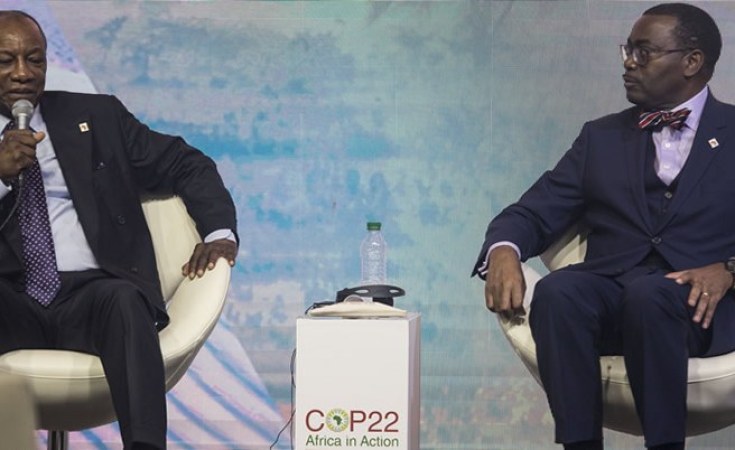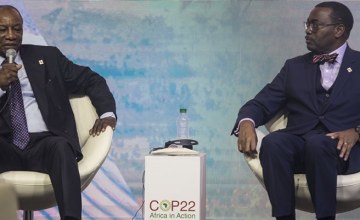African leaders on Wednesday called for speedy action for the implementation of the commitments made at the COP21 in Paris, and urged the fulfillment of the pledges fulfillment of the G7 to provide the financial resources to provide electricity to the millions of Africans.
“This is clearly becoming a COP of action. I am looking forward to the fulfillment of the full pledge of the G7 to provide $10 billion to the initiative. The sooner this is made available, the faster we will all make progress in achieving the goal of universal access to electricity and acceleration of the growth of renewables in Africa’s energy mix,” said AfDB Group President Akinwumi Adesina.
Adesina was speaking at the opening panel of Africa Day, the day when the continent is in the spotlight at the COP22 meetings in Marrakech. The event was attended by several African leaders, including Alpha Condé, President of Guinea and African Union Coordinator for Renewable Energy; Faure Gnassingbé, President of Togo; Ellen Johnson Sirleaf, President of Liberia; Seretse Khama Ian Khama, President of Botswana; and a broad range of stakeholders and partners to give political momentum to Africa’s needs to implement its commitments.
The event took place at the Africa Pavilion – an area dedicated entirely to the continent where climate change issues specific to Africa will be showcased. The AfDB, the Economic Commission for Africa (ECA), the African Union and NEPAD are hosting the Africa Pavilion at COP22.
“I’m happy to see the commitments made by France, Germany and the European Union turn into action,” said President Condé. The Government of France and the African Development Bank on November 6 signed a €6-million agreement for the implementation of the Africa Renewable Energy Initiative. Ségolène Royal, French Minister for Energy Environment, and Marine Affairs, called on the European Union to move fast and urged countries to take action so that the first projects can take off.
Adesina stressed that the African Development Bank is doing its part. The Bank has committed to invest US $12 billion in support of accelerating electricity supply in Africa and leverage between $45-50 billion from the private sector. “The Bank will work with the African Union and other partners to fast-track the “Africa we want”: an Africa with universal access to electricity in the next ten years,” said Adesina.
The Delivery Unit of the Africa Renewable Energy Initiative hosted by the Bank is now fully operational. The Bank is also rapidly building up its institutional capacity to deliver on its agenda for Africa. A new Vice-Presidency for Power, Energy, Climate and Green Growth has been created.
Adesina also noted that the lack of electricity drags down Africa’s growth and development. For decades, Africa has continued to export raw materials. The reason why Africa exports raw unprocessed materials is simple: Africa does not have electricity.
For more information on COP22, visit: www.afdb.org/en/cop22



